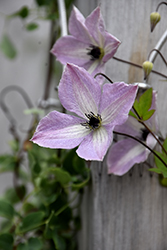Fri & Sat 8am - 8pm
Sun 8am - 7pm
Anytown, USA 12345
fax: 261.787.0463
e-mail: info@successgc.com


Plant Finder

Height: 6 feet
Spacing: 24 inches
Sunlight:
![]()
![]()
Hardiness Zone: 3a
Description:
An interesting hardy and vigorous variety producing a profusion of light pink, almost iridescent flowers; perfect for arches, along fences or trained on arbors; fine, feathery foliage add to the whimsical appearance; can tolerate some shade
Ornamental Features
Fairy Dust Clematis features showy shell pink star-shaped flowers with lavender overtones and a white flare at the ends of the branches from mid summer to early fall. The flowers are excellent for cutting. It has green deciduous foliage. The compound leaves do not develop any appreciable fall color.
Landscape Attributes
Fairy Dust Clematis is a multi-stemmed deciduous woody vine with a twining and trailing habit of growth. Its average texture blends into the landscape, but can be balanced by one or two finer or coarser trees or shrubs for an effective composition.
This is a relatively low maintenance woody vine. It is a Type 2 clematis, which means it will bloom primarily on old wood of the previous season, with a second flush later in summer. Dead and weak vines should be removed in late winter, and remaining vines should be trimmed back to the first buds that are seen to remove dead stems. It is a good choice for attracting hummingbirds to your yard. It has no significant negative characteristics.
Fairy Dust Clematis is recommended for the following landscape applications;
- Accent
- Hedges/Screening
- General Garden Use
- Container Planting
Planting & Growing
Fairy Dust Clematis will grow to be about 6 feet tall at maturity, with a spread of 3 feet. When grown in masses or used as a bedding plant, individual plants should be spaced approximately 24 inches apart. As a climbing vine, it tends to be leggy near the base and should be underplanted with low-growing facer plants. It should be planted near a fence, trellis or other landscape structure where it can be trained to grow upwards on it, or allowed to trail off a retaining wall or slope. It grows at a medium rate, and under ideal conditions can be expected to live for approximately 20 years.
This woody vine does best in full sun to partial shade. It does best in average to evenly moist conditions, but will not tolerate standing water. This plant should not require much in the way of fertilizing once established, although it may appreciate a shot of general-purpose fertilizer from time to time early in the growing season. It is not particular as to soil type or pH. It is highly tolerant of urban pollution and will even thrive in inner city environments. Consider applying a thick mulch around the root zone in both summer and winter to conserve soil moisture and protect it in exposed locations or colder microclimates. This particular variety is an interspecific hybrid.
Fairy Dust Clematis makes a fine choice for the outdoor landscape, but it is also well-suited for use in outdoor pots and containers. Because of its spreading habit of growth, it is ideally suited for use as a 'spiller' in the 'spiller-thriller-filler' container combination; plant it near the edges where it can spill gracefully over the pot. It is even sizeable enough that it can be grown alone in a suitable container. Note that when grown in a container, it may not perform exactly as indicated on the tag - this is to be expected. Also note that when growing plants in outdoor containers and baskets, they may require more frequent waterings than they would in the yard or garden.
